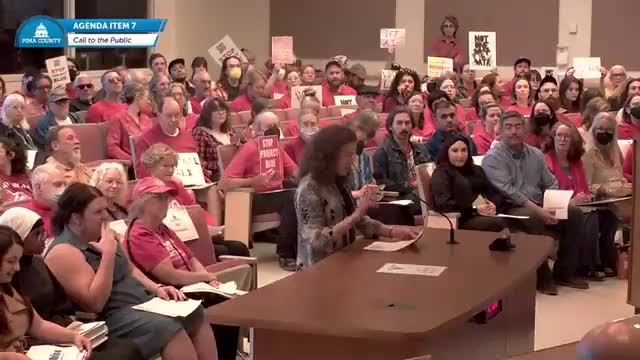Hundreds of residents urge Pima County supervisors to halt Project Blue land sale; board asks TEP for briefing
Get AI-powered insights, summaries, and transcripts
Subscribe
Summary
Hundreds of speakers at the Pima County Board of Supervisors meeting urged the board not to close a land sale tied to Beal/Amazon's Project Blue data center, citing water use, energy demand, public-health and climate concerns. Supervisor Andres Cano asked the county administrator to invite the CEO of Tucson Electric Power to brief the board on the
Hundreds of residents and community groups pressed the Pima County Board of Supervisors on Tuesday to halt a planned land sale tied to Beal/Amazon’s proposed Project Blue data center, arguing the development threatens local water supplies, drives up utility costs and would worsen public-health risks from extreme heat.
Dozens of speakers packed the hearing room and overflow to oppose the land transaction. “We urge you to say no to Project Blue now,” said Lee (last name not specified), a District 2 resident, citing water and health risks. Several speakers warned of long-term infrastructure abandonment and economic risk if a data‑center buildout stalls or the industry contracts.
Why this matters: Callers said the project would consume large volumes of water and electricity and have only a limited lifespan, leaving long-term costs to local ratepayers and utilities. Supervisor Andres Cano asked county administration to invite the CEO of Tucson Electric Power to a future meeting so the board can hear directly about Project Blue’s energy demands and proposed rate impacts, saying the public deserved “to hear directly from Tucson Electric Power, not just the representatives or filings.”
What speakers told the board - Multiple speakers said the data center would sharply increase local power consumption and water use; for example, one speaker said a prior version of the project would have used about 1,825,000 gallons per year. Those figures were presented as assertions by commenters, not as county findings. - Community members described threats to household budgets from proposed utility rate increases. “If you go ahead with this deal, many more people will die from the heat because they won’t be able to afford the energy costs,” said Keithana (last name not specified), citing recent local heat‑related deaths. - Several speakers raised labor and social concerns, including automation risks. “Amazon plans to replace more than half a million jobs with robots,” said Supervisor (name referenced in a news item); speakers used that claim to argue long‑term job promises were uncertain.
Board response and next steps - Supervisor Andres Cano said he had tried to obtain more information directly from TEP and asked the county administrator to invite TEP’s CEO to a future meeting to address energy demand and rate‑impact questions. - Supervisor Karin Allen and others acknowledged community organizing and asked staff and utilities for more detail on projected water and energy use, procurement conditions and contract terms. - The board did not vote to cancel or alter the land sale during the meeting; supervisors and public speakers said further transparency, analysis and meetings with utilities and the developer are needed.
What was not decided: The record contains no formal board action to approve or rescind the underlying land sale at this meeting. Multiple speakers urged the board to refuse closing the transaction; the board asked staff to pursue more information and a TEP briefing to inform potential next steps.
Voices at the meeting: Speakers included dozens of residents and activists, several members of the No Desert Data Center Coalition and neighborhood groups, and supervisors on the dais. Specific presenters at the public hearing included Luke Felix Rose, Laura Silva, June Williams, Lee (surname not specified), and others who detailed economic, water and health risks associated with the proposed data center.
Looking ahead: Supervisor Cano’s request that the county administrator invite Tucson Electric Power to present publicly creates a near‑term opportunity for the board to get utility data in the chamber. Community organizers said they will continue lobbying the board and pursuing legal and public‑pressure campaigns if the county moves forward with closing the sale.
Ending note: Residents repeatedly asked supervisors to weigh long‑term public costs — particularly water and electricity — against short‑term promises of jobs. The board did not take a final vote on the land transaction at the meeting; instead it set a follow‑up path focused on gathering more data and holding a utility briefing.
